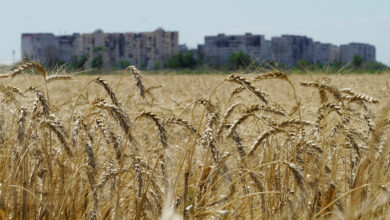Minister of Agriculture and Land Reclamation Ayman Abu Hadid said that wheat production this year reached about 8.5 million tons, and is expected to increase next year between to 9 and 9.5 million tons.
Abu Hadid said in a statement yesterday that this will be through increasing wheat prices, and planting species of high productivity devised in agricultural research centers.
According to him, these species yield of 24 ardebs (134.88 U.S. bushels) per acre compared to 18 ardebs per acre for the species currently cultivated.
Abu Hadid said that this quantity is enough to produce bread, and that there is a need for grain silos to store 9 million tons of wheat in order to be able to overcome the losses, estimated at about 20 percent annually or 1.5 million tons, that occur due to open storage and transport.
The minister stressed the need for expanding local cultivation of wheat to increase productivity vertically.
He said that the expansion in land grants for young people, graduates and small farmers is part of state policy aiming to provide job opportunities for youth.
The minister called for amending the law on illegal land seizures, issued in 2006, to deal with areas less than 100 acres.
Abu Hadida called for establishing a civil society organization to protect the Egyptian countryside, providing awareness programs for farmers and sufficient information on job opportunities and places suitable for investment in the countryside.
Meanwhile, the Sudanese agricultural delegation announced two days ago that an area of 33,000 acres, 450 km north of the southern borders of Egypt, are ready for planting grain crops and wheat as a preliminary step in the wheat cultivation project between Egypt and Sudan.
This comes within the framework of a project between the Egyptian and the Sudanese governments to cultivate wheat in Ad Damazin area, Sennar State, and River Nile State in north Sudan.
Fawzy Naeem, former president of the Agricultural Research Center and head of the Egyptian delegation to Sudan, said that these areas come within the framework of three Sudanese projects: Gabriya, Bakrie and Ahamdab.
He added that irrigation, electricity and road networks are activated in the meantime to be ready for use next season to grow wheat and other strategic crops such as corn and oil crops to fill the food gap in both countries.
Naeem said Egypt's contracts with Sudanese farmers will be in accordance with international prices, especially with regards wheat and corn.
Translated from the Arabic Edition




